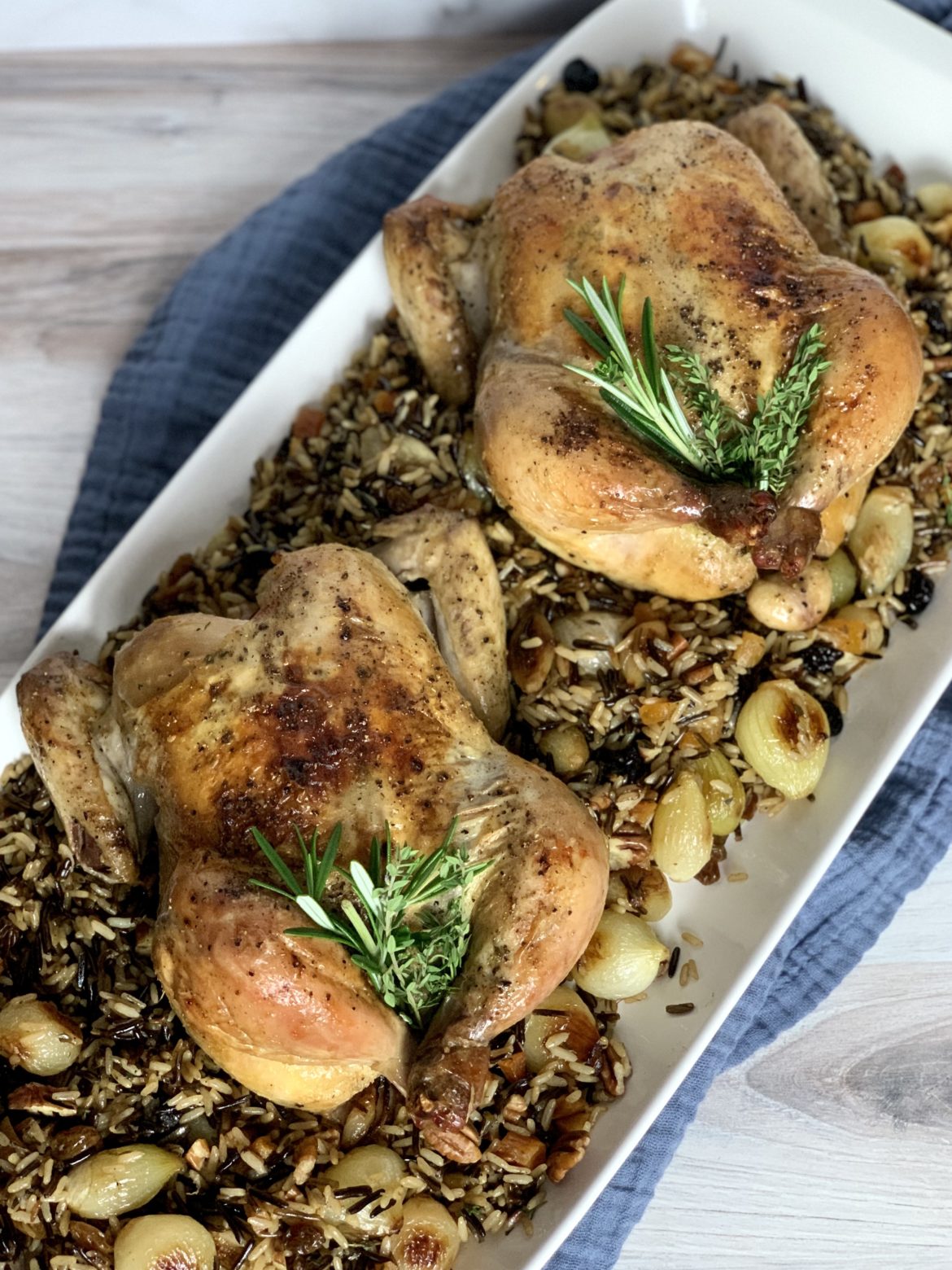These delicious Cornish game hens will make a stunning appearance at any holiday or special gathering. Plump, tender and gorgeous little hens are seasoned and roasted to perfection. What is a Cornish game hen? Cornish game hens are young and tender chickens that are roughly 2.5 pounds or less. They are neither Cornish nor game and half the time they are males. They are ideal for a fancy and impressive dinner. Since they are so small and the breast meat tends to dry out, I like to brine mine in a simple mixture to ensure a perfectly moist and tender bird.
HISTORY
Alphonsine Therese Makowsky, known as Te to her friends, is credited with breeding the Rock Cornish Game Hen at her Connecticut farm around 1950. According to her obituary, in 1946 the Makowskys bought a farm and began to raise and sell African guinea hens. In 1949, a fire destroyed their stock, so to keep up with supplier demands, she got the idea from a book to cross-bred Cornish game cocks with various birds, such as the White Plymouth Rock hen and the Malayn fighting cock. The result was the Rock Cornish Game Hen – a small bird with short legs and a plump, round breast perfectly sized for a single serving. By the mid-1950s, they were selling more than 3,000 Rock Cornish game hens per day and suppliers couldn’t get enough. Over time, they made their way to our dining room tables and the rest is history. Not only did Te create a wildly popular bird, but she also developed many recipes. They sold their business, Idle Wild Farms, in 1967 and moved to Sarasota, FL. After her husband’s death, she moved to Danville, CA.
HOW I MADE MY CORNISH HENS
A juicy bird begins with a brine – wet or dry. Brining imparts flavor and moisture deep into the muscle and it ensures your chicken or turkey doesn’t dry out when roasting. I’m using a wet brine. A basic wet brine ratio is 1 Tablespoon salt to 1 cup of water. You can also infuse with aromatics. Brine a minimum of 1 hour, but not to exceed 10 hours (about 45 minutes per pound of protein).
Note: If adding seasonings and herbs to infuse the brine, bring the liquid to a boil and allow to cool before brining the hens. You can infuse your brine with various herbs, seasonings and aromatics – try apple cider, honey, molasses, garlic, orange peel, lemon peel, star anise, coriander or fennel seeds to name a few. Just be creative and go with what you like.
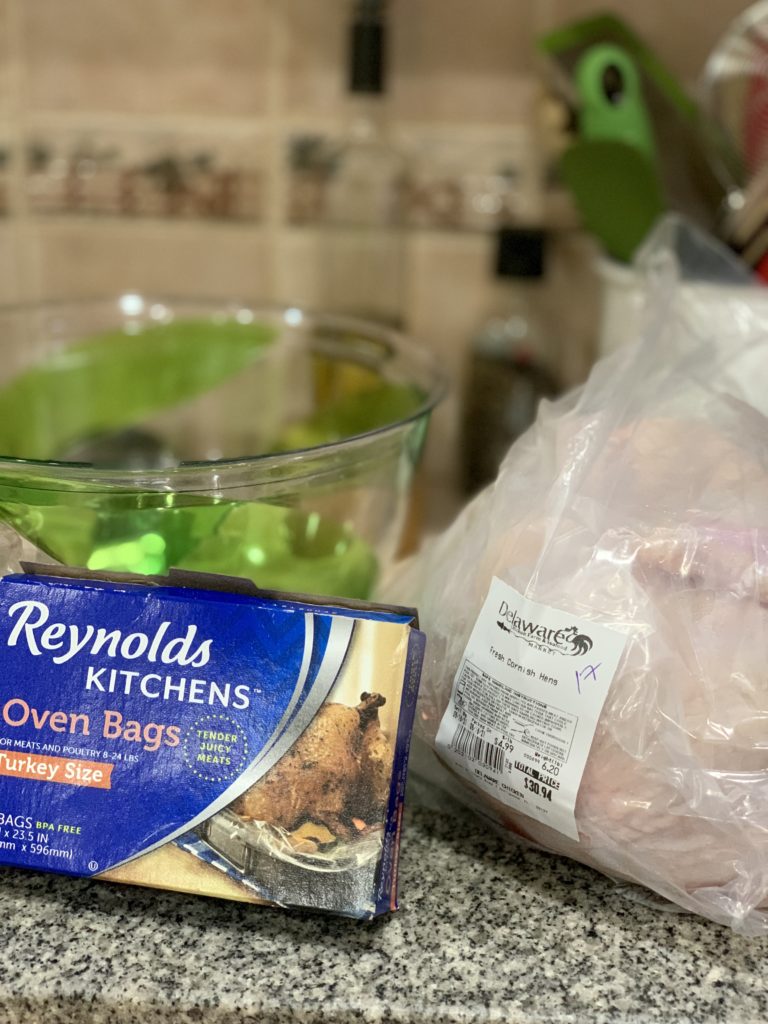
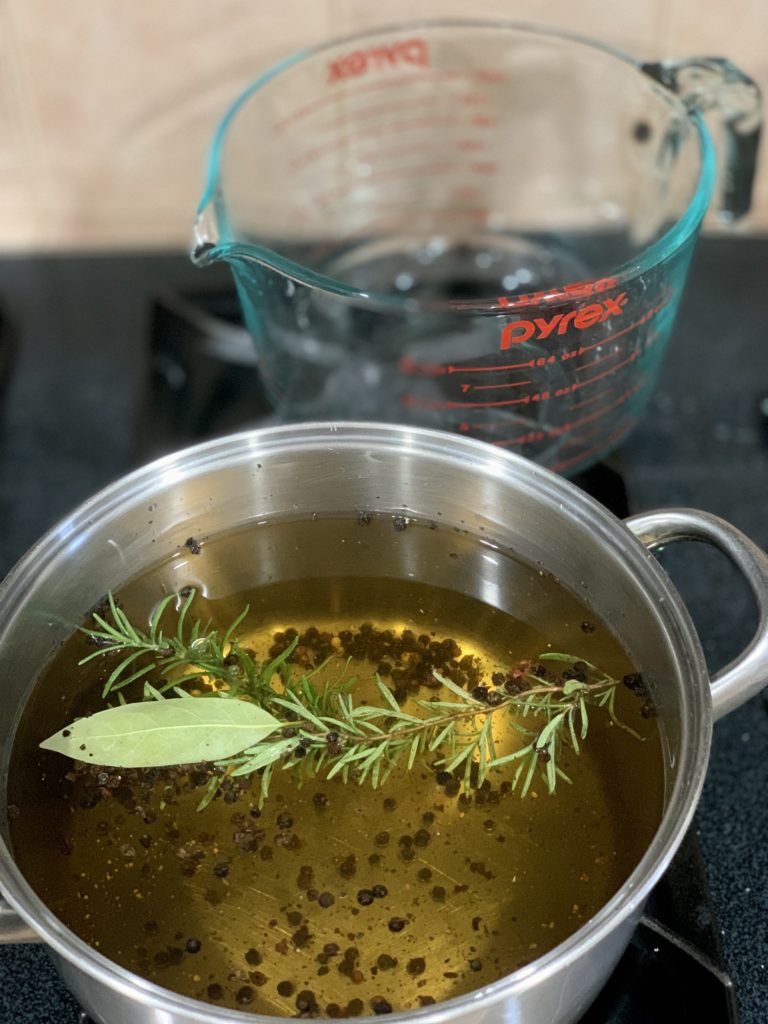
Using this ratio as my guide, I combined 6 Tablespoons of Diamond kosher salt, 1/3 cup light brown sugar in 6 cups (48 ounces) of water, a generous Tablespoon of black peppercorns, 1 bay leaf and 2 sprigs of rosemary. I brought the mixture to a boil and allowed to cool before submerging my hens in the brine.
Note: Diamond kosher salt is widely used by professional chefs and it is less salty than other salts. I do not recommend using sea salt or iodized table salt. If using Morton kosher salt, check the salinity as not all kosher salts are the same.
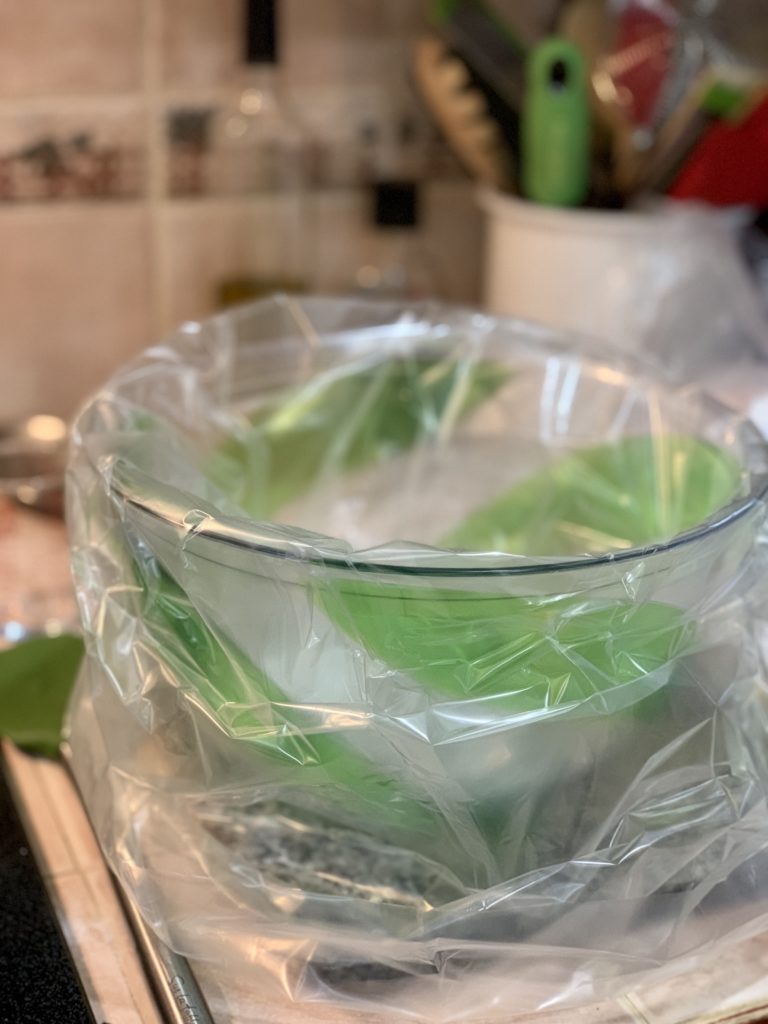
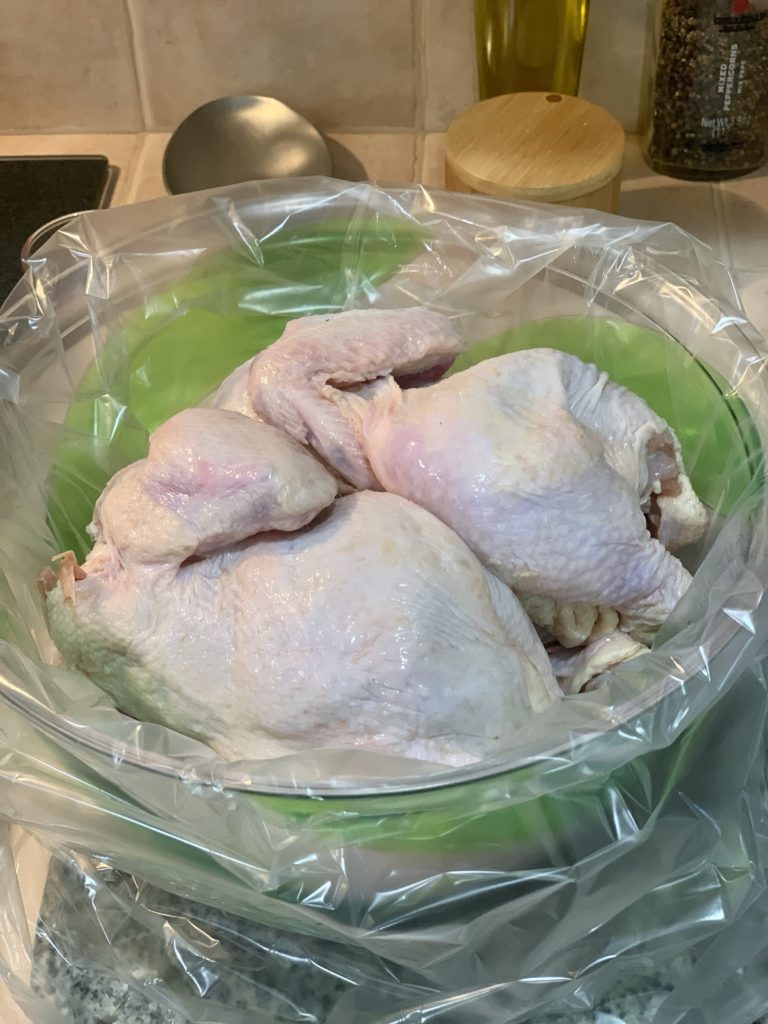
At 3 lbs each, my fresh Cornish game hens were on the larger side so I only purchased two hens. I used a large bowl and lined it with a turkey size Reynolds Oven Bag. I placed them in the bag side by side, breast side inward, poured the brine over the hens and removed any air pockets before securing the bag. At 6 pounds combined, I brined for 3 hours in the refrigerator – a little less than the per pound recommendation, but it worked just fine.
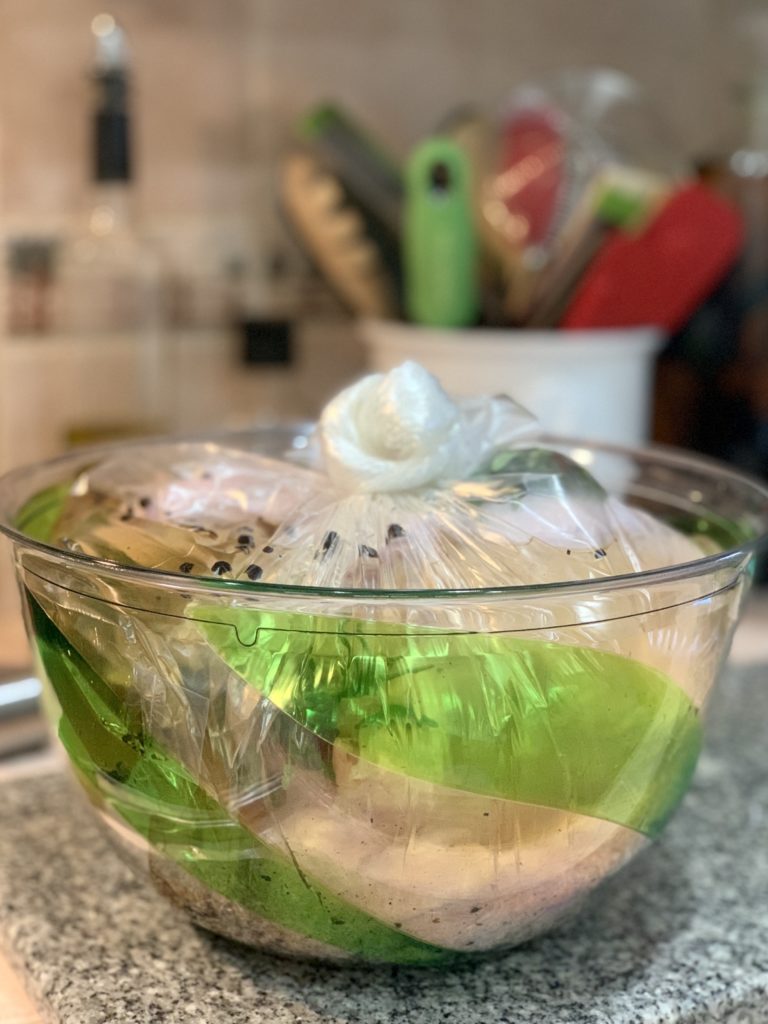
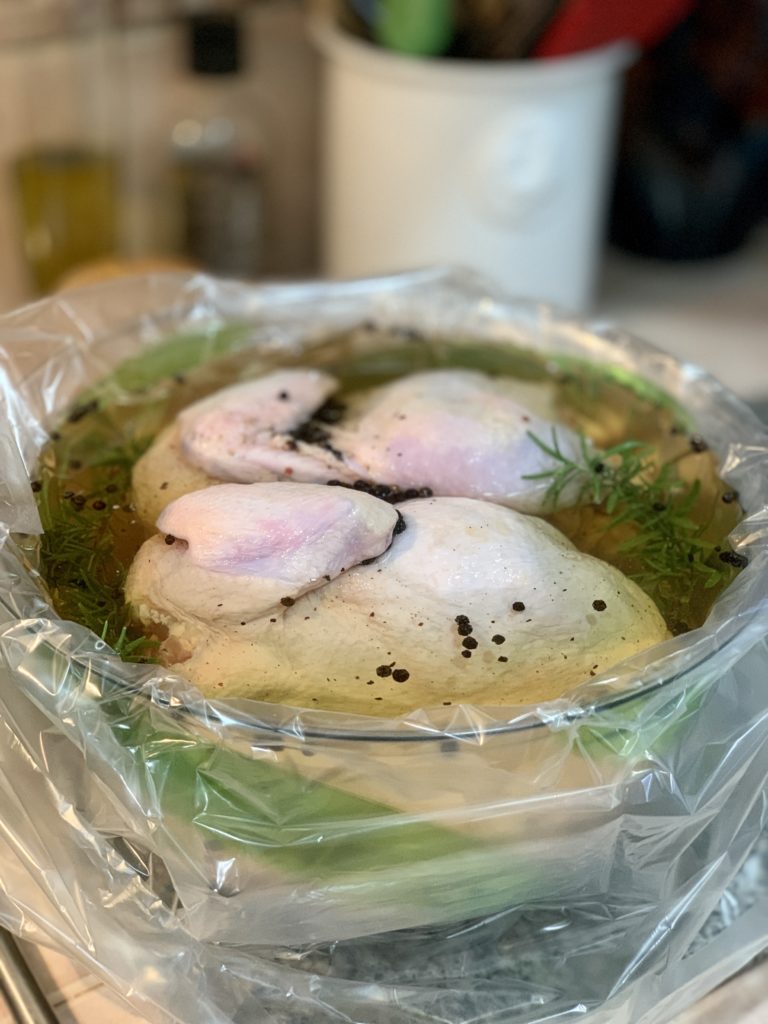
Once brined, remove the hens, rinse and pat them dry with paper towels. Discard the brine and oven bag. Place the hens uncovered in the refrigerator for an hour to fully dry the surface. If you want crispy skin, it must be dry.
Set them out at room temperature for at least 30 minutes so the hens lose their chill. In order to roast evenly, the hens or any protein needs to be close to room temperature. Otherwise, the outside will be roasted while the core may be raw or unevenly roasted.
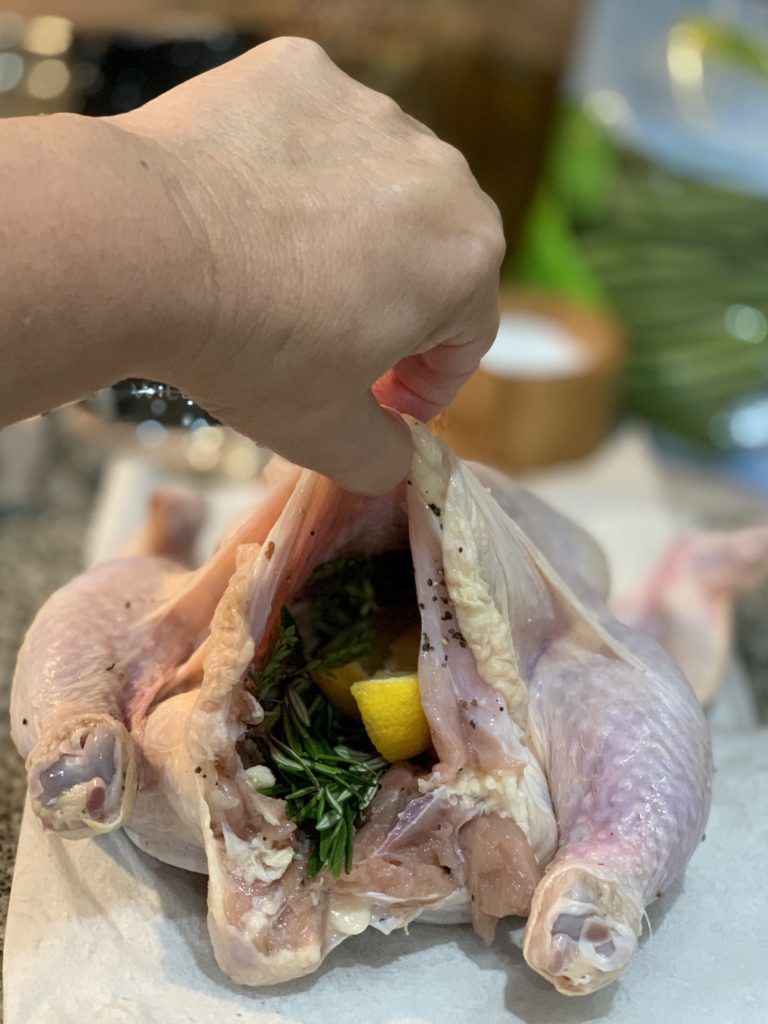
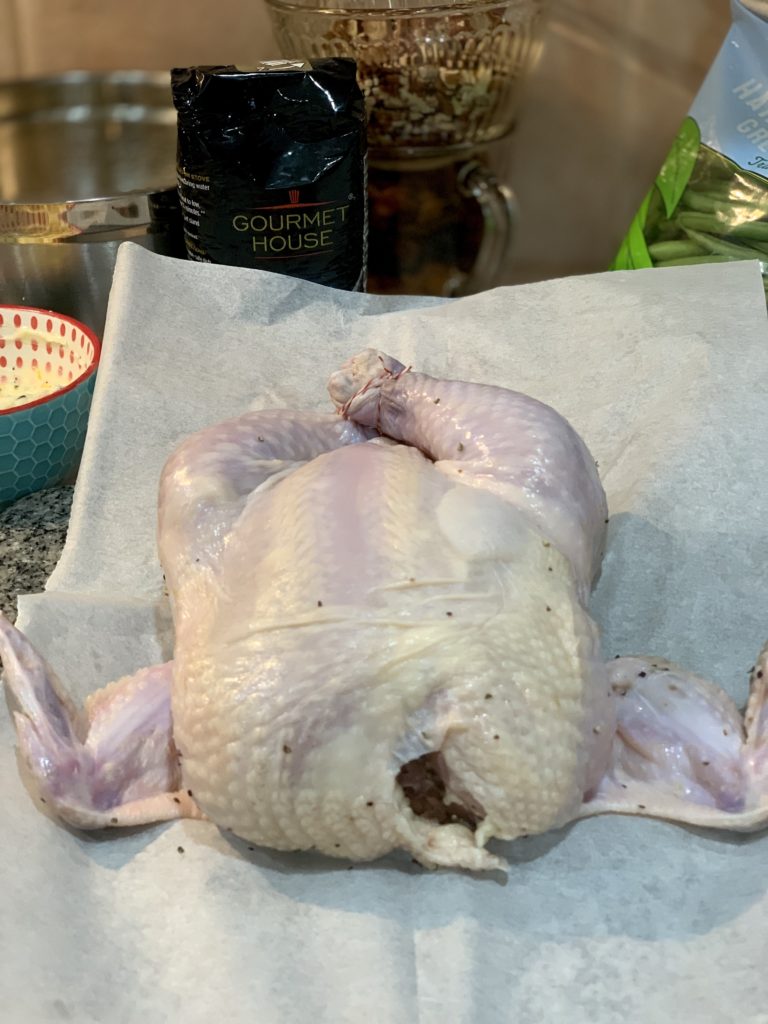
Preheat the oven to 425°F and place the rack in the center position. Have your baking/roasting pan ready. Lightly salt and pepper the cavity and insert a lemon wedge along with a sprig of rosemary and thyme. Truss the legs with twine.
Tip: Trussing the legs promotes even roasting and tucking the wings under the hens keep them from burning.
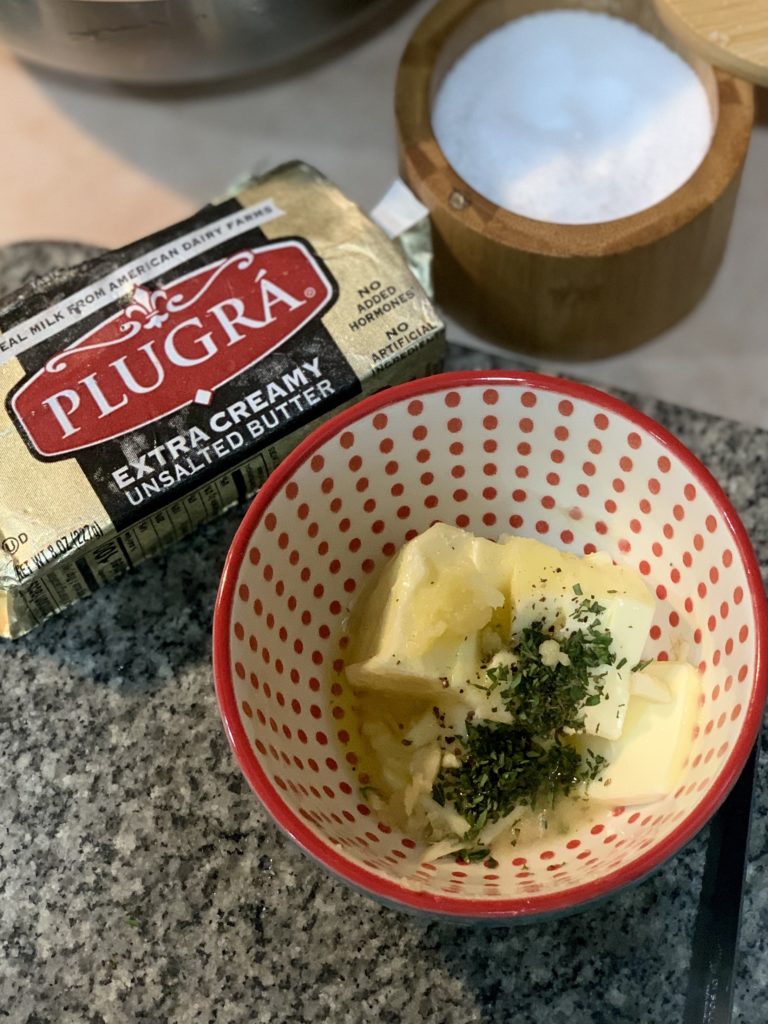
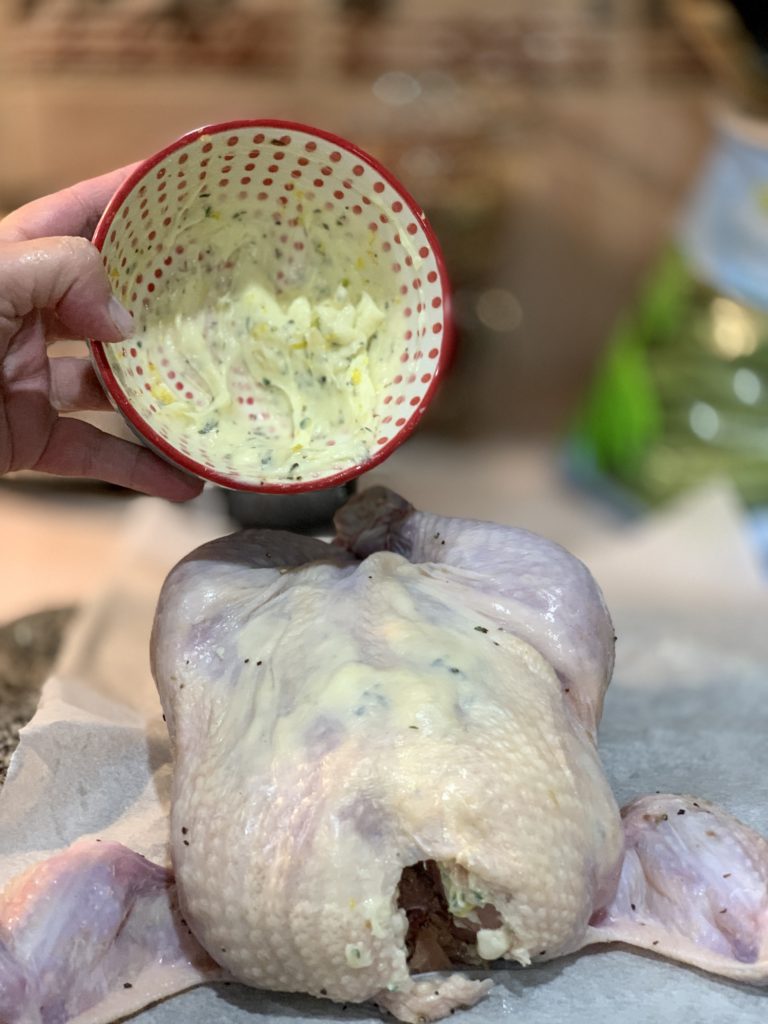
Make a simple compound butter. I followed a method, not a hard fast recipe. I combined about 5 Tablespoons of softened Plugra unsalted butter, a grated garlic clove, a pinch of Diamond kosher salt, some fresh cracked black pepper, lemon zest (instead of juice) and minced a combination of rosemary and thyme. Mix well to combine and set aside.
Note: I’ve linked my Maître d’Hôtel Butter here. It’s a traditional French compound butter that goes well with everything from bread to chicken, steaks and seafood.
Using your fingers, gently separate the skin from the breast and spread 1/3 of the compound butter on each breast. Be careful not to tear the skin. I reserved the remaining third for my Easy Haricots Verts Almondine.
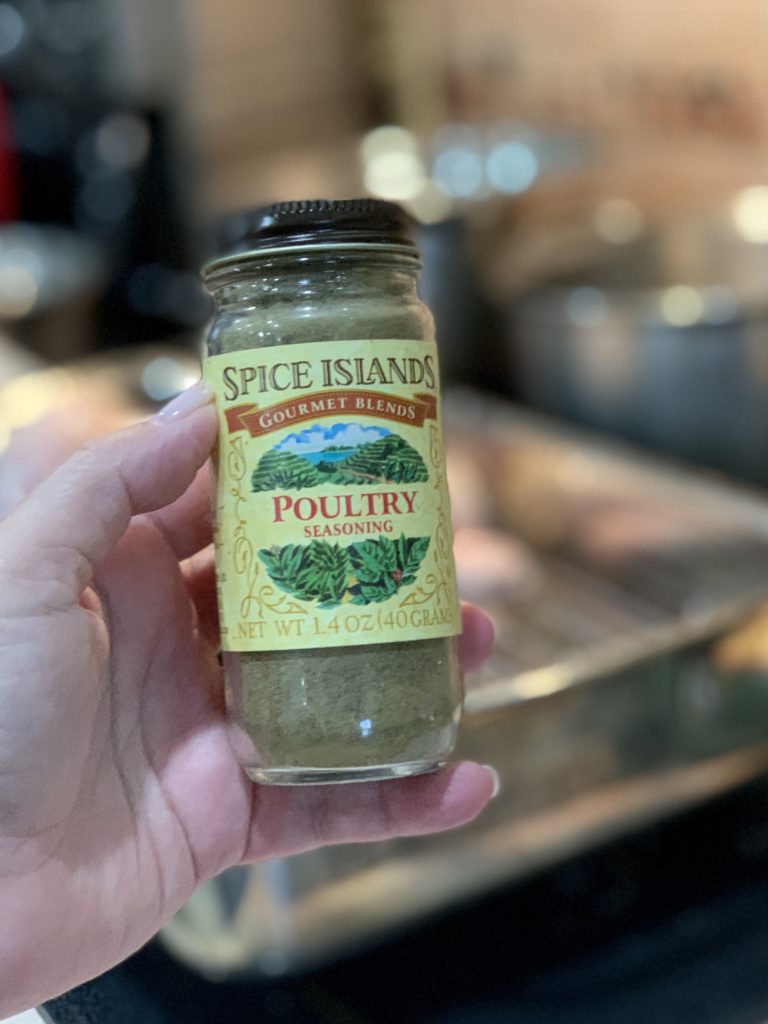
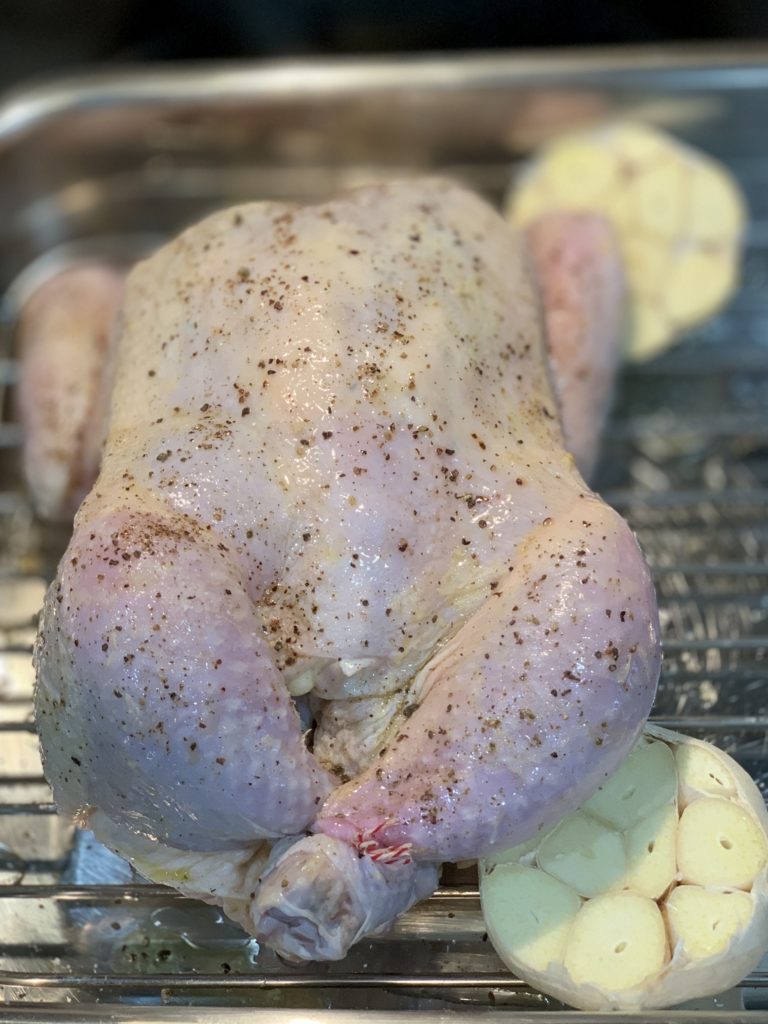
Lightly coat the dry skin with extra virgin olive oil and lightly season with kosher salt, black pepper and dust with poultry seasoning. Tuck the wings under to prevent from burning and transfer the hens to the roasting pan. Add a halved lemon, a halved head of garlic, 1/3 cup low sodium chicken stock, 1/3 cup white wine with a sprig each of rosemary and thyme. Roast at 425° for 30 minutes.
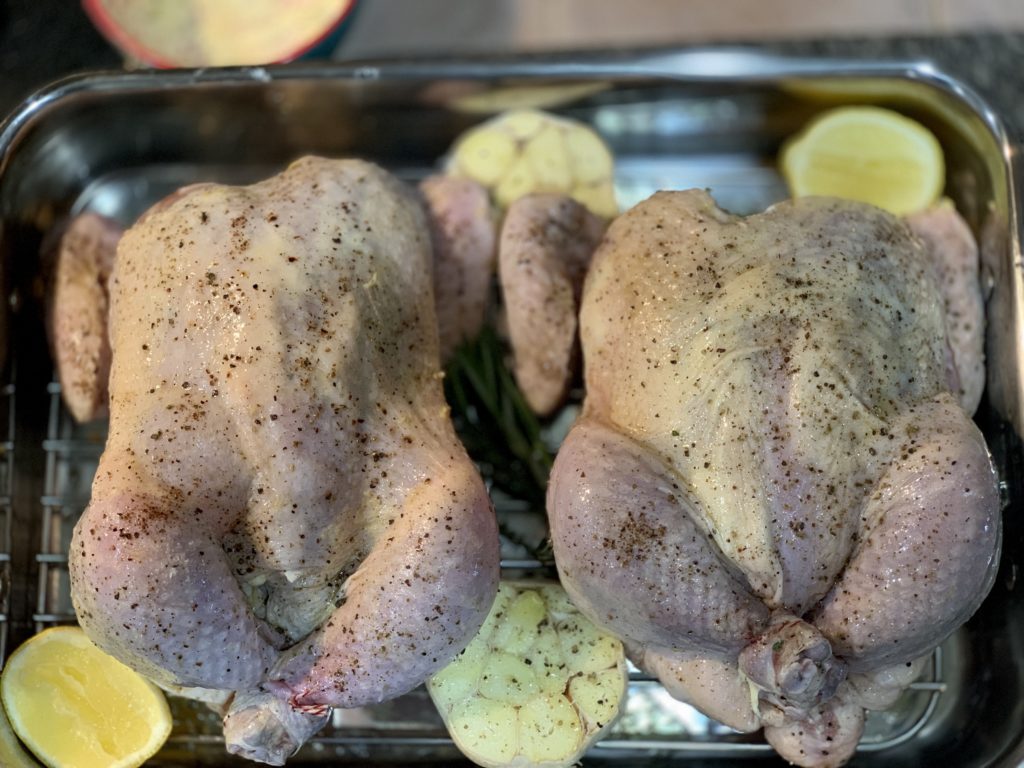
Make a basting sauce by combining 1/3 cup low sodium chicken stock, 1/3 cup white wine and 1 Tablespoon olive oil. Reduce temperature to 350°F and pour the basting sauce over the hens. Roast for 30 – 35 minutes or until the hens are golden brown. You can use a meat thermometer to check for doneness, the internal temperature should read 180°F. Remove from the oven, loosely tent with foil and allow the meat to rest for 15 minutes.
Note: Protein needs to rest otherwise the juices will run out.
TO MAKE A GRAVY
Transfer all the juices and drippings to a sauce pan. Cook over medium heat for about 5 minutes to reduce and concentrate the flavors. In a Pyrex measuring cup, whisk together a Tablespoon of cornstarch with some of the reduced drippings. Pour into the drippings and whisk until thickened to desired consistency. If too thick, you can add a little chicken stock to loosen the gravy. Taste and reseason, as needed. For a richer sauce, you can also add about 1/4 cup of heavy whipping cream.
Note: I didn’t make a rich gravy sauce, I simply reduce the dripping and made a lighter sauce.
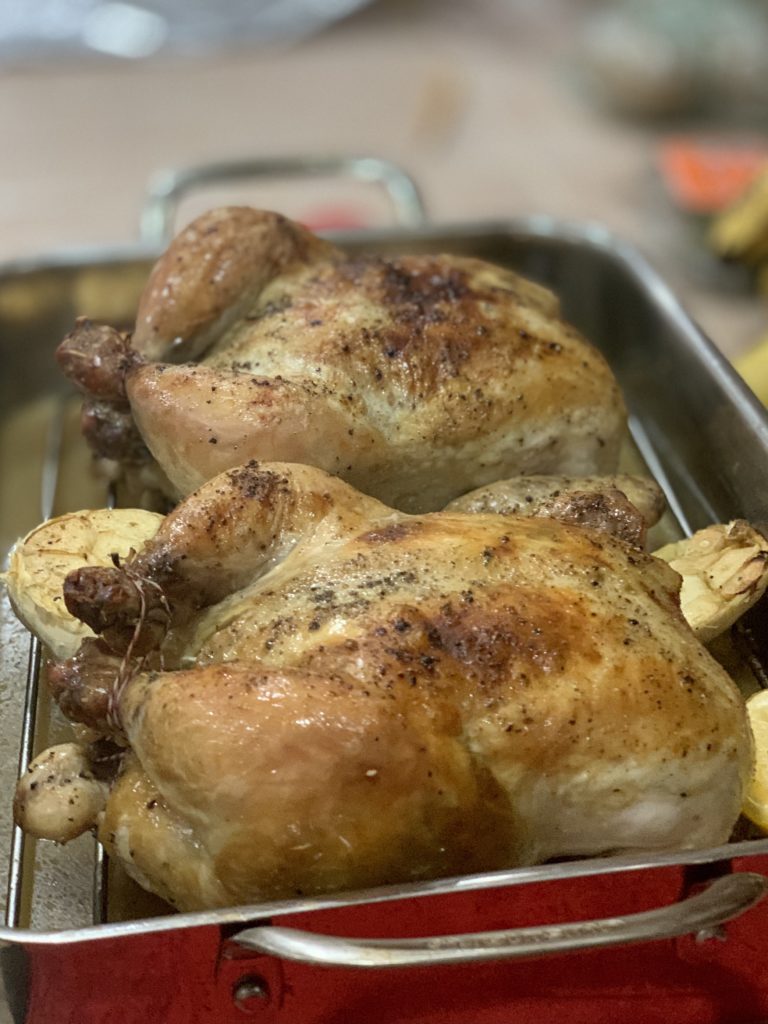
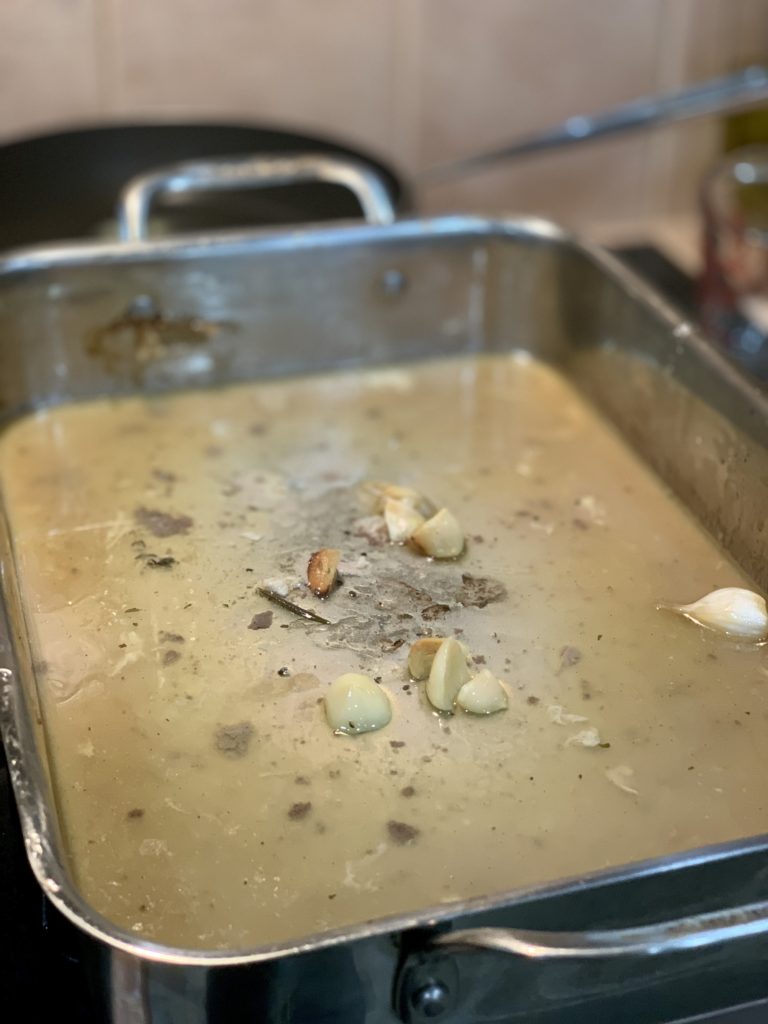
These Cornish game hens made an impressive appearance at our holiday table. Not only were they plump and juicy, but they were perfectly seasoned. I find these to be a wonderful alternative for Thanksgiving. Let’s face it, not everyone loves turkey and sometimes a turkey is too large for smaller gatherings. I served these over my Wild Rice Pilaf with Pearl Onions, Cranberries & Apricots.
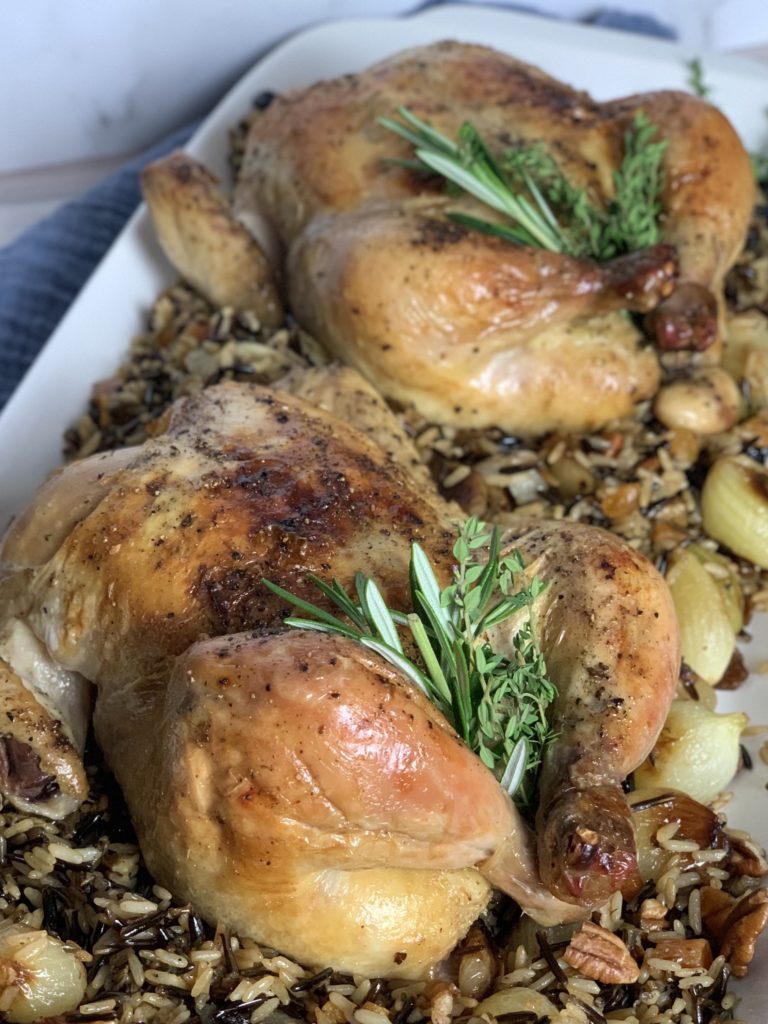
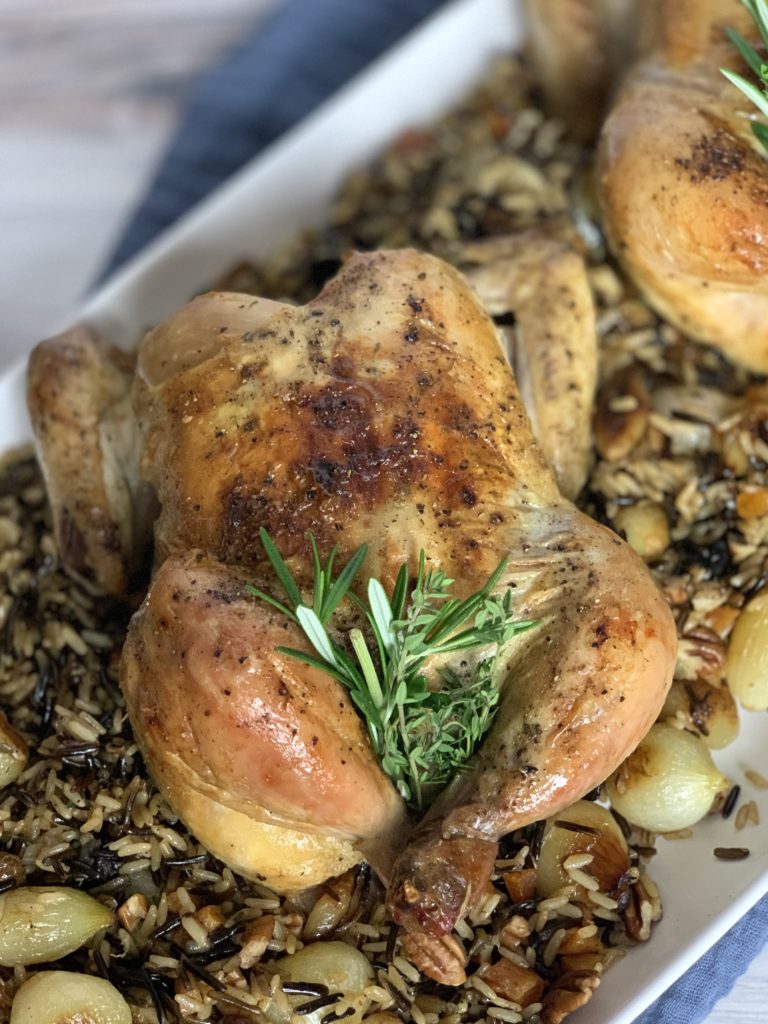
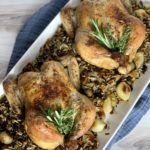
Cornish Game Hens with Lemon, Garlic, Rosemary and Thyme
These moist and juicy Cornish game hens will impress your guests every time! Perfect for special occasions and holiday meals.
Ingredients
WET BRINE
- 6 cups water
- 6 Tablespoons kosher salt prefer Diamond brand
- ⅓ cup light brown sugar, packed
- 1 generous Tablespoon peppercorns
- 1 bay leaf
- 1 spring rosemary
CORNISH GAME HENS
- 1 Cornish game hen per person see recipe notes
- kosher salt prefer Diamond brand
- fresh cracked black pepper
- 1 lemon wedge per hen cavity aromatic
- 1 sprig each of rosemary & thyme per hen cavity aromatic
- about 3 Tablespoons extra virgin olive oil, divided
- poultry seasoning
- 1 lemon, cut in half roasted with hens
- 1 head of garlic, cut in half roasted with hens
- ⅔ cup low sodium chicken stock, divided roasted with hens
- ⅔ cup white wine, divided roasted with hens
- 1 sprig each of rosemary & thyme roasted with hens
COMPOUND BUTTER MIXTURE
- 5 Tablespoons unsalted butter, room temperature prefer Plugra
- 1 garlic clove, grated or mashed into a paste
- zest of half a lemon can be from the lemon you use in the cavity
- 1 Tablespoon of herb mix of rosemary & thyme, finely minced
- pinch of kosher salt
- black pepper
GRAVY (Optional)
- 1 Tablespoon cornstarch
- ¼ cup heavy whipping cream
Instructions
MAKING THE BRINE
-
Combine all the ingredients in a pot and bring to a boil to infuse the water with the aromatics. Allow to cool completely before brining the hens.
BRINING THE HENS
-
Line a bowl or container large enough to hold the hens and brining liquid with a Reynolds Oven Bag (turkey size) or Brining bag.
-
Pour brine mixture over the hens, remove any air pockets and seal the bag. Refrigerate and brine for approximately 45 minutes per pound. I only brined mine for 3 hours.
-
After the hens have brined, rinse and pat dry with paper towels. Refrigerate uncovered for 1 hour to allow the skin to properly dry. Dry skin equals crispy skin.
ROASTING THE HENS
-
Preheat the oven to 425°F and place the rack in the center position. Have the roasting pan ready.
-
Lightly salt and pepper the cavity of each hen and insert a lemon wedge along with a spring of rosemary and thyme. Truss the legs with kitchen twine.
-
Mash together all the compound butter ingredients in a small bowl and divide by the number of hens. Use your finger to gently separate the skin from the breast and spread the compound butter under the skin.
-
Coat the hens with olive oil and reserve 1 Tablespoon. Rub the olive oil all over the hens including the thighs and wings. Lightly season with kosher salt, black pepper and dust poultry seasoning over the hens. Tuck the wings under the hens to prevent the tips from burning.
-
Transfer the hens to the roasting pan and add the halved garlic head, halved lemon, ⅓ cup low sodium chicken stock, ⅓ cup white wine and a spring each of rosemary and thyme. Roast for 30 minutes.
-
In a Pyrex cup, combine reserved ⅓ cup low sodium chicken stock, ⅓ cup white wine and 1 Tablespoon of olive oil to make the basting liquid.
-
Reduce temperature to 350°F and pour the basting liquid over the hens. Roast for 30-35 minutes or until the hens are golden. If checking for doneness with a thermometer, the internal temperature should read 180°F.
-
Remove the hens from the oven, transfer to a platter, loosely tent with foil and allow to rest at least 15 minutes. Discard herbs and lemons, reserve roasted garlic.
Note: Garlic was used as a roasting aromatic. You can save the roasted garlic for another dish or appetizer or you can add a few garlic cloves to the gravy below.
MAKING THE GRAVY (Optional)
-
Transfer the roasting pan dripping and any juices the hens released while resting into a small stock pot. Cook over medium heat for 5 minutes to reduce and concentrate flavors. Taste and reseason. If adding a few garlic cloves, mash them with the back of a spoon.
-
Optional: To thicken the sauce, make a cornstarch slurry by whisking 1 Tablespoon of cornstarch with some of the pan drippings in a Pyrex cup. Pour slurry back into the stock pot and whisk until the sauce is thick. For a rich and creamy gravy, whisk in about ¼ cup of heavy whipping cream.
Note: if you want a smooth gravy, pour it through a sieve to remove any pieces that didn't dissolve well.
Recipe Notes
Cornish game hens are a young and tender chicken that are usually small and weigh less than 2.5 lbs. Typical serving is one hen per person. If the hens are greater than 2.5 lbs, you may serve half a hen per person.

